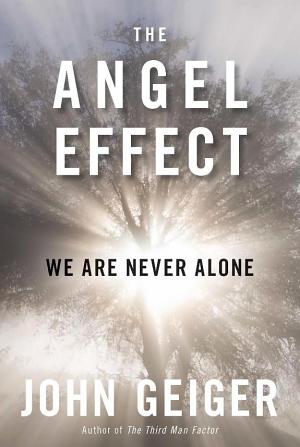“When people in Ancient Greece, or in Biblical times, or the Middle Ages, or in the First World War, or today, talk about angels intervening, historians have always dismissed their accounts as lies or considered them allegorical. I am now convinced that these are real, lived experiences. When people talk of angels, they should be taken seriously.” — John Geiger
‘Tis the season for angels, and here at the Patheos Book Club, we are indeed taking them seriously after reading John Geiger’s remarkable new book The Angel Effect: The Powerful Force That Ensures We Are Never Alone. In his second book documenting such experiences, Geiger shares story after incredible story of ordinary people who claim to have been visited, and often saved from tragedy, by an unseen, benevolent and guiding presence. Most of them, when interviewed about the experience later, referred to their visitors in no uncertain terms as “angels.”
We caught up with John Geiger to find out more about his research on angel sightings and what he’s learned about this shockingly common experience. Most importantly, we wanted to know: are angels real, or not?
What is the “angel effect”?
When people are in danger, under stress or in need, they often describe the sense that an unseen being has come to aid them. They describe receiving guidance, comfort and advice. Some credit the intervention with saving their life. Neurologists call these cases examples of the “sensed presence” phenomenon and the researchers are desperately trying to explain how it happens, believing that it is a product of the brain. Most of those who have had this experience have a different explanation entirely. They say it was an angel. Thus the term: “the angel effect.”
 How did you come to be interested in this phenomenon? What inspired your first, and especially this second book, on what you also refer to as ‘the third man factor’?
How did you come to be interested in this phenomenon? What inspired your first, and especially this second book, on what you also refer to as ‘the third man factor’?
I became interested in the experience that Sir Ernest Shackleton had during his desperate effort to save his crew and survive after having his ship, Endurance, crushed by ice in Antarctica. He described being accompanied to safety by an unseen presence, what became known as the “third man.” Shackleton himself termed it a divine companion. He was an earthy explorer, but felt it was a spiritual experience. Many other explorers and adventurers have had the same thing happen to them, including the aviator Charles Lindbergh, and many of them also considered it an angel or God. I discuss this in my first book on the subject, The Third Man Factor. This new book, The Angel Effect, takes it much further, however, as it shows this can happen to anybody. You don’t have to be in Antarctica or in space to experience the angel effect. It can happen in your own living room. It happened to me.
You say these experiences of a felt presence guiding and calming people during times of stress are shockingly common. How prevalent are angel encounters, and why don’t we hear about them more?
This is much more common that most people realize. I think every one of us has the potential to have this experience when in danger or under stress. I can’t understand why it is not better recognized beyond the faith community. There is a willful blindness about the angel effect. The attitude seems to be, if science can’t explain it, then it doesn’t exist. Well it does exist, and science has so far not been able to explain it. I think some people who have had the experience don’t want to own up to it. They don’t want to share it because they are afraid of what other people will think. The Angel Effect is filled with examples because a great many people had the courage to come forward and say, ‘this happened to me.’
Do these experiences occur more often with people of faith?
What is interesting to me is that it is not more common among people of faith. Certainly it does happen to people who are Christian, or have other spiritual beliefs. But this happens to secular people as well. It is not as if any of these people, whether they are religious or not, sought out the angel effect. It happens when they are at a moment of crisis in their lives, sometimes in life and death situations, and sometimes when facing a more low-grade, even existential, crisis.
Briefly, share what the research from the scientific community has proven or surmised about these “angel” experiences … and how conclusive it is.
There are lots of scientific theories. Some are psychological, others neurological, but none has been able to explain one of the fundamental characteristics of the phenomenon, and that is that it is a benevolent experience that can offer practical advice that helps people in profound ways.
The Angel Effect deals with all the theories, such as the belief by some psychologists that it’s evoked by what’s called “messianic ecology”, that is to say it’s the product of expectations, such as what’s expected to happen at pilgrimage sites and in other spiritual contexts, like church, and it’s the product of a pattern of devotion and prayer.
Another psychological theory is that the presence is the product of absence: we are a highly social species, and when we are under stress and feel alone and ill-equipped for that stress we create a friend. In other words, that it is a psychological coping mechanism. Then there is the bicameral mind, the idea that this is one brain hemisphere talking to another. Beyond that, there’s a host of neurological theories, such as that it’s an externalized second self, that it is a stress-induced brain event. One of the more interesting theories is that it’s the product of the HADD (Hypersensitive Agent Detection Device), which is an innate human survival mechanism to alert us to external threats. The problem in there is no conclusive proof for any of these.
And what “evidence” is there for believing these experiences are of God?
We can’t prove an organic basis, but nor can we prove a spiritual basis. It just comes down to faith. How do you prove the existence of angels? You do it by looking at their handiwork, the good deeds. And you ask people who have had this experience what they think it was, and guess what? Most will say it was an angel, or Christ, or God.
Many people of faith who might believe in angels also wrestle with the problem of theodicy, or God’s ‘absence’ for people in tragedies? Do you have any explanation based on your research of why some people experience guardian angels appearing, and often saving their lives, while others don’t?
I do take this question up in the book. There are a couple of possibilities: One is that some people are more open to experience. It’s one of the psychological variables. We might all be receiving such help in times of crisis, but some people are just not open to acknowledging such advice or comfort. They will rationalize it away. They will consider it a sign of breakdown, not of strength, and they will disregard it. Or, a religious explanation would be that while an angel could intervene to assist you, the angel will not because it knows that injury, suffering or death will bring a person closer to God. Aquinas wrote that “Sometimes, in the workings of providence, a man must suffer trouble; this is not prevented by the guardian angel.”
What was the most surprising thing about writing this book?
I was surprised by the courage of so many people to come forward and share their extraordinary experiences. I have never imagined how many forms these interventions could take, and how remarkable each is. I was also surprised by my own realization that, while the theories for the phenomenon, spiritual and scientific, are fascinating, at the end of the day the fact of the angel effect is all that really matters. This book is proof of the existence of angels — or of a brain experience that is a perfect match for what we have always thought of as an encounter with the angelic. That is pretty surprising in of itself.
Can you share one or two of some of the most extraordinary stories from your book?
There are so many amazing stories, it’s hard to choose just one or two. There’s Arthur Agnew, a cab driver who had developed a severe drinking problem to the point where his family was being destroyed, he was unemployed, he was physically a wreck. He was about to start another beer when he experienced a presence that told him that if he took one more sip of it, he would die. The intervention changed his life forever. He has never had another drink.
There’s Susan Denis, a wonderfully brave woman in Maryland, who was operating a B&B when she was diagnosed with a rare, often terminal, form of brain cancer, who after surgery was visited by unseen beings sent, she feels, by Jesus or by God, and who gave her great strength and comfort. She is today successfully battling the disease.
There’s a young woman in California, Kelly Smith, who decided to hitchhike because of a sudden rainstorm, and was picked up and assaulted by a man with a knife. She knew he intended to kill her, but an angel appeared. It gave her strength and told her exactly what to say to the man. She was able to literally talk him into ending the attack and releasing her.
There are so many examples, involving car crashes, plane crashes, childbirth, depression, illness.
What is your own faith background, and how, if it all, has your your faith changed as a result of researching and writing The Angel Effect? Where have you personally landed on whether angels exist or not?
I’m an Episcopalian. I had never really given angels a great deal of thought before I began to research this subject, I had just assumed they were more or less metaphorical. I am now convinced that something profound is happening, and I think we need to look at history differently. When people in Ancient Greece, or in Biblical times, or the Middle Ages, or in the First World War, or today, talk about angels intervening, historians have always dismissed their accounts as lies or considered them allegorical. I am now convinced that these are real, lived experiences. When people talk of angels, they should be taken seriously.
Who do you hope reads your book, and what do you hope they take away from it?
It’s important that people read this book because it might just save them one day. They might face an immediate physical threat or even profound loneliness or a health crisis, and how they respond to what flows from that — that sense of an unseen being – could decide their fate. If they are willing, and open, it can be an enormous comfort to them, it might even save their life.
Set aside the question of what causes this. The fact is it happens. We are never, truly, alone. There is a companion we can call on when most in need. Think about that fact. It is startling and important. Why aren’t we talking about this more?
For more conversation on The Angel Effect – and to read a book excerpt – visit the Patheos Book club here.













